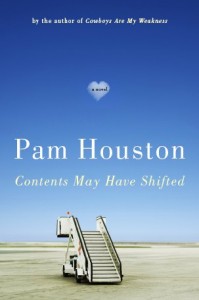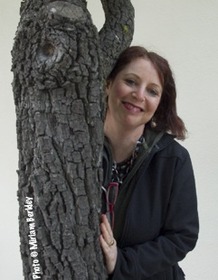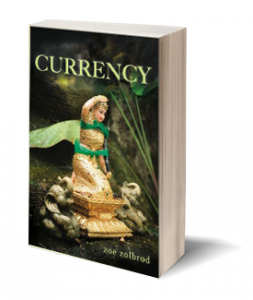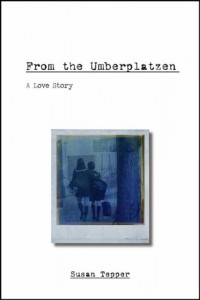 Pam Houston is the author of two collections of linked short stories, Cowboys Are My Weakness and Waltzing the Cat, the novel, Sight Hound, and a collection of essays called A Little More About Me, all published by W.W. Norton. Her stories have been selected for volumes of Best American Short Stories, The O. Henry Awards, The Pushcart Prize, and Best American Short Stories of the Century. She is the winner of the Western States Book Award, the WILLA award for contemporary fiction, and The Evil Companions Literary Award and multiple teaching awards. She is the Director of Creative Writing at U.C. Davis and teaches in The Pacific University low residency MFA program, and at writer’s conferences around the country and the world. She lives on a ranch at 9,000 feet in Colorado near the headwaters of the Rio Grande. Her new book, Contents May Have Shifted, will be published by W.W. Norton on February 6th, 2012. Author photo by Adam Karsten.
Pam Houston is the author of two collections of linked short stories, Cowboys Are My Weakness and Waltzing the Cat, the novel, Sight Hound, and a collection of essays called A Little More About Me, all published by W.W. Norton. Her stories have been selected for volumes of Best American Short Stories, The O. Henry Awards, The Pushcart Prize, and Best American Short Stories of the Century. She is the winner of the Western States Book Award, the WILLA award for contemporary fiction, and The Evil Companions Literary Award and multiple teaching awards. She is the Director of Creative Writing at U.C. Davis and teaches in The Pacific University low residency MFA program, and at writer’s conferences around the country and the world. She lives on a ranch at 9,000 feet in Colorado near the headwaters of the Rio Grande. Her new book, Contents May Have Shifted, will be published by W.W. Norton on February 6th, 2012. Author photo by Adam Karsten.
What is your feeling about having mentors as a writer? Talk about the mentor relationship if you will, its importance to a writer…
I didn’t exactly have mentors where I was coming up as a writer. I had wonderful undergraduate teachers, who taught me everything about how to be a person, and ultimately how to be a teacher, but as far as the real writing went, my mentors were more on the page then in the flesh. Writers I admired greatly, but in most cases never met, or met much later in my life. Alice Munro, Toni Morrison, Don Delillo: the usual suspects I guess, along with some very important dead writers: D.H. Lawrence, James Joyce, William Faulkner, Willa Cather. Now I spend the better part of my life mentoring students. I direct a graduate CW program at UC Davis, I teach in the Pacific University low-res MFA program, and a low-res program is truly all about mentoring in ways a hi-res program doesn’t even approach, and I have a private group of students that meet twice a year.
It is probably true that I throw myself into the mentoring process as a kind of a do-over for what I missed having in my own life, and the fact that so many of the students I have mentored have gone on to publish books seems like a testimony to the value of the process. And yet there was also something really valuable about having to work as hard as I had to work to decipher what those dead and distant authors were doing on the page, because they weren’t there in person to explain it to me. We have this whole massive industry these days where writers work extremely hard to articulate and share their writing process, we give craft talk after craft talk until we get so sick of our “process” that we never want to write another word, and while there is much to be learned this way, I also wonder what is lost because aspiring writers don’t have to enter that difficult water by themselves.
What do you do when you feel stuck or uninspired and does it work to trick the brain into working?
I believed the poets when they said “form will set you free.” As long as I have some form in mind for a piece I am writing–even if it is a form I am going to violate later on in the writing process-as long as I have boxes of a certain size and shape to fill, it is rare that I get truly stuck. Stalled, yes. Bored, disheartened, maybe. But not truly stuck.
In Sight Hound I had 12 first person narrators, and at first I thought they would all speak once, and then I thought they would all speak twice, and I even had them each speaking three times before I realized they all didn’t have to speak the same number of times, but by that time, see, I had tricked myself into filling all of those little boxes of story.
In Contents May Have Shifted, I decided very early on that there would be 132 very short chapters, all titled with the place name of the place they took place, and 12 chapters that took place no place, in the air, and they would be titled with the flight numbers of the airplanes they included.
Faced with a writing day, you see, it is much easier to say, I am going to write the two pages of concrete physical details that will ultimately be called Santa Cruz, Argentina, or Juneau, Alaska, then it is to say I am going to WORK ON MY NOVEL. And 12 12’s-a gross-was interesting to me in and of itself. I felt I could work on those 144 little pieces forever.
Are there favorite writing exercises you give students that you can share?
Well, unsurprisingly, given what I have just said, I often ask my fiction students to write formal poems. Pantoums have a particularly wonderful self-generating quality. Other than that, my favorite exercise, though to call it “favorite” or “exercise” is misleading, because it is simply what I do, day in and day out, is that I ask students to write three separate scenes, three moments where the world caught their attention, where it glimmered at them in some significant way. I ask that one glimmer must be from the last 24 hours, one must be from more than 10 years ago, and the third one can be from any time they want. The way those three glimmers will speak to one another, by virtue of the fact that they were called up by the same mind on the same day is often quite interesting, and in combination they will often comprise the bare bones of a story. In a certain way, this exercise is what Contents May Have Shifted is, taken to the nth degree.
Suggestions for making characters live? Do you know your characters beforehand, or do you find out who they are in the process? When I read your first collection Cowboys are my Weakness I was struck by the pendulum-like traits of bravery and vulnerability in your characters.
Well, I don’t make any secret of the fact that every book contains a Pam-like character, a woman of a certain age, trying to pay strict attention to the things that glimmer at her and form from that a way to live intentionally. And since I know a version of that character intimately, she’s comes ready made in three dimensions. As for the other characters, I have to go back to that same observer…the part of me that pays very strict attention to the world around me, which includes lots of different kinds of characters, right?
There is always a moment, after having met someone, when they do or say some telltale thing that reveals their character, their understory, or at least implies it. If you pay attention you won’t miss these when they are offered. Writing great characters seems to me about giving them those tiny gestures, some offhand line of dialogue, something they wear or eat, that gestures pointedly at their understory. John Updike was a master at this. If you study his short stories you will see what I mean.
How can getting older enhance our strengths in writing? What changes? What must we watch out for?
Well, lets get what to watch out for out of the way first. We don’t want to, above all else, I think, become parodies of ourselves. That is one of the scariest things I can think of.
But on the brighter side, I got to spend a few days recently with my dear friend Terry Tempest Williams. The two of us have been at this writing game together for a long time. I have a picture of us signing our first books at a little table in Salt Lake City from 1992-we were such babies…we don’t look old enough to drink, even if you added us together. But recently we talked about being 50, about how maybe at 50 it was time to step into our voices in a new, more confident way, and take more risks, maybe even say outloud the things we have long suspected…own our intuitive sense of how things work on this planet, dare to speak even the uncomfortable truths. Terry has written a book called When Women Were Birds (Farrar, April, 2012) that takes this idea of voice as its subject. It is going to give thousands of women, and lots of men too, I reckon, permission to speak more freely. That is what age on a woman is all about, I think. Permission. Permission to say, “I like this and I don’t like that and here are some things that I think that might be worth hearing.”
On the simplest level, our writing should get better as we get older because we have read more, we have written more, and with luck, we have learned to be less and less defensive.
What’s the best writing advice you ever got? And/or the best living advice?
Henry James said, “a writer should strive to be a person on whom nothing is lost.”
Once, in LAX airport, Carlos Casteneda told me that a lot of changes were going to be coming to my life and I ought to face those changes with love instead of fear.
Not a day goes by when I don’t think about both of those.
Tell us anything and everything you can about your new book. What an exciting time for you!

Contents May Have Shifted is a novel of 144 very short chapters, all narrated by a woman named Pam, each named with the place they take place: Istanbul Turkey, Juneau Alaska, Marfa Texas, Trenton New Jersey. Except for twelve of them which take place no place, in other words, 39,000 feet above the earth on an airplane. In this way the book is a kind of photo album in words.
Pam’s work takes her all around the country and the world, and in each place she’s trying to understand exactly what that place has to teach her. There is a man at the beginning, and a better man at the end, a child, dogs, horses, and a whole lot of smart, funny women friends. There are churches and temples and mosques; acupuncturists, watsu practitioners and monks. There are icebergs, mudslides, glow worms, blow holes, and several near misses in the sky. Some readers have said it is a book about looking for something to believe in, about finding faith in a faithless age. One said it was a book about friendship, which I think you could make a case for, because Pam’s friends have all the best one liners. Sometimes I think it is a meditation on perpetual motion, on freedom versus settling down. Terry (Tempest Williams) said it was my own personal Book of Runes. I will live with it a while out in the world before I know what it is about for certain. What I can say now is that it is me doing exactly what I am inclined to do on the page.
What is next?
Good question. I have been writing some essays. One on writing, one on alcohol, one on Mongolia…but those are just keeping me occupied while I wait for whatever comes next. I once tried to write a book of letters, and I didn’t know enough at the time to make the form transcend itself…I might give that another try.
The Fictionaut Five is our ongoing series of interviews with Fictionaut authors. Every Wednesday, Meg Pokrass asks a writer five (or more) questions. Meg is the editor-at-large for BLIP Magazine, and her stories and poems have been published widely. Her first full collection of flash fiction, “Damn Sure Right” is now out from Press 53. She blogs athttp://megpokrass.com.


 Welcome to the inaugural installment of Editor’s Eye, a new blog series that aims to highlight noteworthy work that might have slipped through the cracks of Fictionaut’s
Welcome to the inaugural installment of Editor’s Eye, a new blog series that aims to highlight noteworthy work that might have slipped through the cracks of Fictionaut’s 
 In the late-90s, I sat down to write from the point of view of a Thai man for a workshop assignment. Although I’m usually a slow writer, I churned out over twenty pages in one sitting and was left breathless and exhilarated. I felt like the character-Piv-was there with me, narrating, and I was just taking dictation. I was compelled by his voice and his story in a way I never had been before, and I knew I had the seed for a novel.
In the late-90s, I sat down to write from the point of view of a Thai man for a workshop assignment. Although I’m usually a slow writer, I churned out over twenty pages in one sitting and was left breathless and exhilarated. I felt like the character-Piv-was there with me, narrating, and I was just taking dictation. I was compelled by his voice and his story in a way I never had been before, and I knew I had the seed for a novel. Happy New Year!
Happy New Year! 